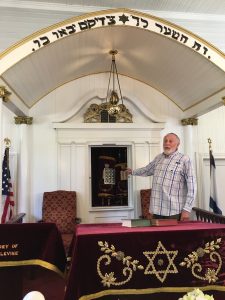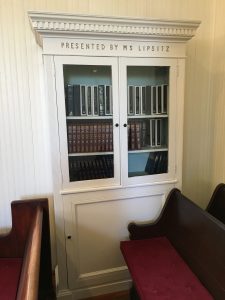Welcome to the South – A Weekly Letter From Rabbi Davis – May 4, 2018
Shalom Chaverim,
I have enjoyed a wonderful week traveling with folks from Beth El. We traveled from Charleston down to Savannah and traveled back through history as we explored Jewish life in the south. There are far too many stories and pictures to share in this letter. But here’s one that sticks with me.
Fast forward from the Revolutionary War, the Civil War and civil rights to modern times. We encountered one story of modern Jewish life over and over. It’s the story of a small Jewish community proud of its rich heritage and working hard to survive. It is the story of Charles Kresch.
Charles was originally from New Jersey. He moved down south and spent a number of years in Charleston before deciding to move.
When Charles first came to check out Beaufort, he wandered down the main street opposite the marina. He came upon a dentist office open and being himself a dentist, he walked in. Turns out the owner (who was also Jewish) was literally packing boxes to close the practice. The two got to talking and after an hour, Charles had bought the business on a handshake.
Charles felt so welcomed and embraced by the Jewish community that he dedicated his retirement to giving back to the community. He served as president of the towns only synagogue for 20 years. Now he’s working to ensure that it survives long past him, focusing his efforts on fundraising and building maintenance.
Charles is very proud of the community, proud that congregants have been prominent, active members of society. At one time, he said, the city’s mayor, state senator, and school board president, etc. were all members of the congregation. There was little anti-semitism in town. And the shul has had good relations with nearby churches (including, sharing a parking lot).
Beth Israel is a small, Conservative synagogue, only 85 members. Recently, their cantor retired. They don’t have a rabbi but are in the market for one. “If you know anyone,” Charles said, “it’s a great place. You don’t get paid too much but you don’t work too hard either.” In the meantime, there are knowledgeable lay leaders who are committed to the congregation. They lead services on Friday nights and holidays, less so on Shabbat morning.
Unfortunately, there are few Jewish children in the area. Beaufort has a large retirement community. And as much as Charles has tried, he finds that people who move from northern states feel like they’ve already done their to part to live and support Jewish life. So it’s been a struggle to get them to join the synagogue. But Charles is not giving up. He has confidence and a positive attitude: “We have succeeded in making this small community work quite well,” he said. “We’ll keep going. We’ll be here.”
I came away from Charles inspired by his dedication and by his attitude. Among other things, he reminded me, as do the participants on our trip, that one never retires from Jewish life. There’s always more to learn, always more of our tradition and our history to explore, always another mitzvah to do. And davka retirement years should be a time to be more, not less involved.
Over and over we’ve been told that people come to visit the south for a short vacation and end up staying a lifetime. There is indeed a southern hospitality that is warm and compelling. That is why as long as people like Charles Kresch continue to open their shuls and open their hearts, their communities will indeed continue to “Be there.”
L’shalom,
Rabbi Alexander Davis
adavis@bethelsynagogue.org
 Charles Kresch showing us the ark of Beth Israel Synagogue
Charles Kresch showing us the ark of Beth Israel Synagogue

This cabinet which stands in the back of the synagogue is over 100 years old. It was made from an old shipping crate reflecting the history of Jewish merchants in the area. Appropriately, now it contains siddurim and chumashim thus expressing the fact that we have long been a wandering people. But as long as we brought our learning with us to each new land, we survived. Indeed, Charles emphasized how lucky the congregation is to have knowledgeable lay leaders. Without them, he said, they could not continue.
